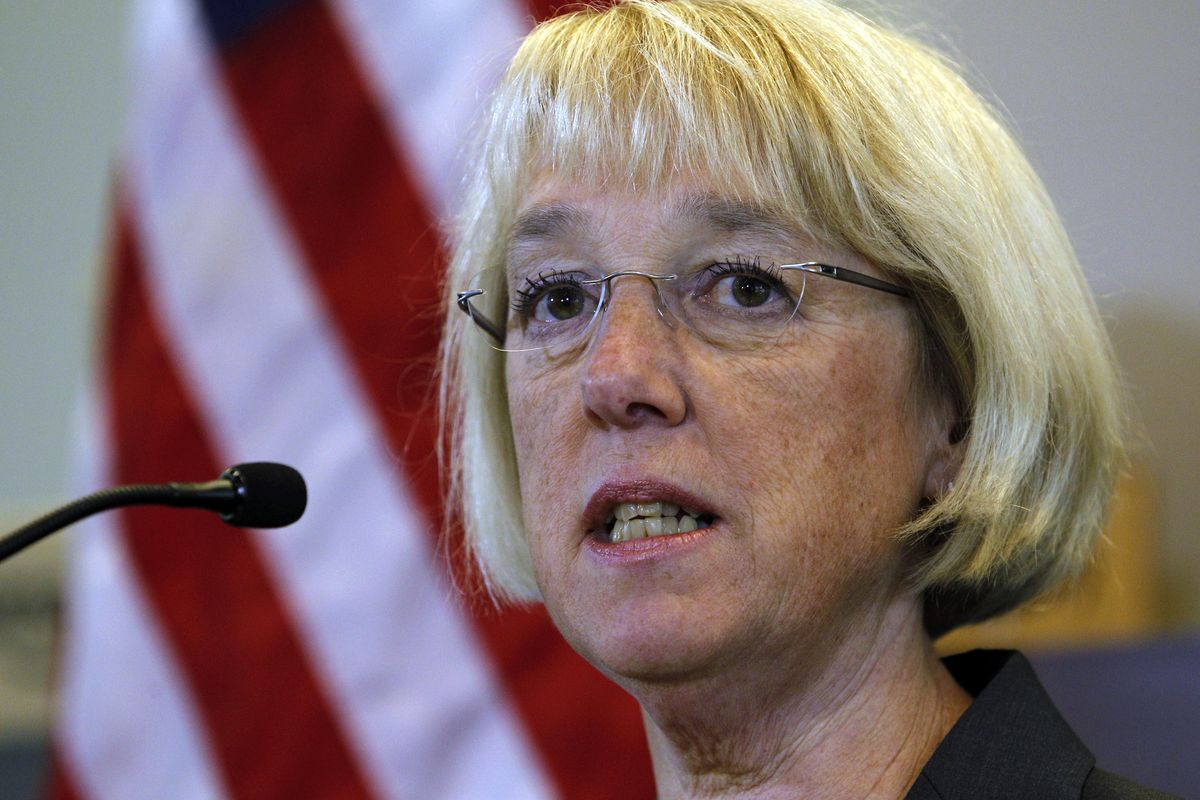Odd couple from Congress helms debt panel
Murray, co-chair have history of toeing party lines

WASHINGTON – He’s a Texas conservative who chose law school over chicken farming. She’s a liberal from Seattle with steel in the toes of her famous tennis shoes. They have almost nothing in common.
Republican Rep. Jeb Hensarling and Democratic Sen. Patty Murray are the Capitol’s latest odd couple, two of Congress’ most partisan lawmakers co-chairing the new supercommittee that begins work today on a bipartisan deal to slow the nation’s mushrooming debt.
They have plenty of reasons to get to “yes.” Blowing a Thanksgiving deadline for a plan to shave federal deficits by at least $1.2 trillion over the next decade would trigger automatic cuts to defense and social programs dear to their respective parties.
Failure also wouldn’t do much for Congress’ standing in the eyes of jittery investors or the public going into next year’s elections. Already, 87 percent of those polled disapprove of the job Congress is doing.
But “no” beckons, too. Hensarling’s uncompromising demands for spending cuts, now central to his party’s agenda, appeal to a Republican base that party leaders are depending on to defend their House majority.
“There will be a lot of pressure on him to work with her, but there’s nothing in Jeb Hensarling’s history to suggest he’d be willing to do that,” said Cal Jillson, professor of political science at Southern Methodist University.
Murray is Hensarling’s ideological opposite, a dogged fighter on behalf of veterans, health and workplace safety programs and regulations.
“There’s not a lot there that would indicate that deficit reduction would be a priority for her,” said John Wilkerson, a political scientist at the University of Washington.
Neither has to vote for the committee’s package in the end. Their role is to make it possible for a majority of the panel to pass it.
So far, they’re together on the logistics.
“I’ve talked to him more than my kids in the last three weeks,” Murray told reporters Wednesday. “We’re doing good.”
Aides say the two have agreed on the need for a serious and respectful tone. They’re sharing staff, turning down most interviews and steering clear of the hard lines on taxes and spending that hobbled President Barack Obama’s negotiations with House Speaker John Boehner.
Murray, who turns 60 next month, was elected in 1992’s “year of the woman” in part by turning an insult – a bureaucrat derided her as “a mom in tennis shoes” – into a rallying cry. Don’t be fooled by the nurturing image. She owes her plum assignment in part to a willingness to play hardball over two decades on Capitol Hill.
She is the first woman to chair the Senate Veterans Affairs Committee, a policy area with personal roots. Her father, Dave, won the Purple Heart as one of the first GIs to land on Okinawa and was diagnosed with multiple sclerosis when she was a teenager.
She also is her party’s Senate campaign chief for the 2012 elections, when the seats of 21 Democrats and two independents will be on the ballot with the party’s majority at stake. Murray took the post after others had turned it down, one reason Majority Leader Harry Reid elevated her to the high-profile helm of the supercommittee, Democratic officials said.
“Absolute proof that Democrats are not serious about deficit reduction,” Republican National Committee Chairman Reince Priebus said of Murray’s appointment last month. “The select committee is no place for someone whose top priority is fundraising and politics.”
Reid wanted a woman in the chairman’s seat and he has long been a fan of Murray’s style, according to Democrats close to his thinking. She is not of federal Washington, does not often do the talk show or party circuits and has a tendency to be unreadable when others might schmooze – a quality that might help keep supercommittee Democrats from caving on party priorities.
Hensarling, 54, is the son of a chicken farmer and a protégé of former Sen. Phil Gramm. Elected to the House in 2002, he made cutting federal spending, ending earmarks and reducing the size of government his priorities before the tea party came into existence.
“One of the House GOP’s most relentless foes of Washington’s culture of spending,” Boehner, R-Ohio, then minority leader, said of Hensarling last year.
In 2008, GOP leaders appointed him to a five-member panel overseeing the government’s $700 billion bank bailout after leading the opposition to it.
Two years later, he confronted Obama at the House Republicans’ annual retreat, saying the president and his fellow Democrats now owned the state of the economy. Obama said the comments were an example of why serious policy discussions are so hard to come by in polarized Washington.
Hensarling’s Republican colleagues say they expect him to remain civil and polite but to stick to the party’s demand to eventually balancing the budget through large cuts in benefit and other spending programs and no tax increases.